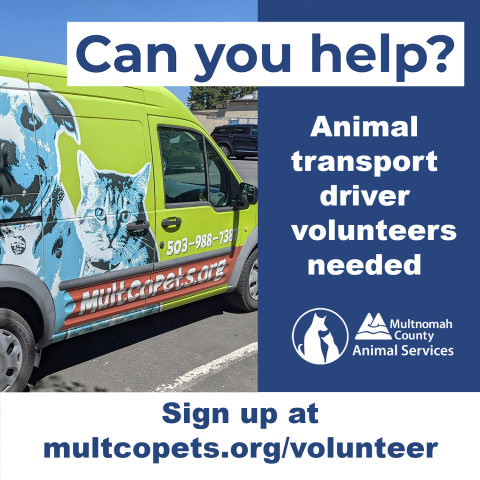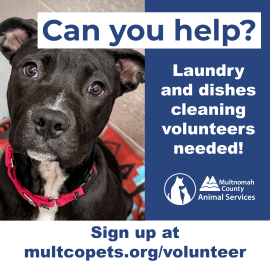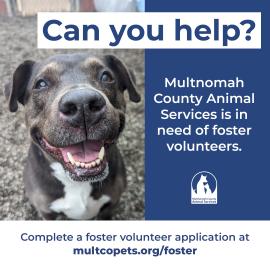Animal Transport Driver Volunteers Needed
Can you help? MCAS is seeking Volunteer Animal Transport Drivers to support shelter animals receiving spay or neuter surgery from veterinary partners before adoption, and for animal transfers.
You can make a big difference in the lives of animals, gain valuable experience, and connect with a passionate community of volunteers and animal welfare professionals. Your commitment, even for a few hours a month, is invaluable to MCAS and the animals we serve. Please help spread the word to your qualified friends!
Position Description
As a volunteer animal transport driver for Multnomah County Animal Services, you'll play an essential role in providing safe and reliable transportation for animals in our care. It is vital that we are ensuring timely movement of animals between various locations. You will operate a Multnomah County vehicle, or your own vehicle if you choose, and work with the MCAS Volunteer Coordinator and Transfer Coordinator to transport animals for one of two key tasks:
- Transporting shelter animals to and from community veterinary partners, where they will receive spay or neuter surgery prior to adoption at MCAS. This is a strategy to help address MCAS surgery capacity issues.
- Transporting shelter animals from MCAS to a community transfer partner - regional shelters and rescues who will place them for adoption. You can learn more about where MCAS shelter animals are transferred in our monthly reports in the Outcomes section.
You will be provided with a transport van, but have the option of using your own vehicle if you choose.
Responsibilities
- Safely transporting animals from their origin to their destination.
- Ensure the comfort and security of animals during transport by following MCAS handling protocols and using provided crates and carriers.
- Maintain accurate records of mileage and transport details for reporting.
- Communicate effectively with MCAS staff, volunteers, and foster families regarding transport schedules, animal needs, and any concerns that may arise.
- Treat all animals with compassion and respect.
- Adhere to all traffic laws and safety regulations while operating your personal vehicle.
- Be flexible and available for transports on short notice as needed.
Qualifications
- Valid driver's license.
- Signing a risk management form
- Passion for animal welfare and a commitment to the MCAS mission.
- Excellent communication and interpersonal skills.
- Ability to work independently and as part of a team.
- Comfort handling animals of various sizes, breeds, and temperaments.
- Access to email communication for transport alerts.
Time Commitment
- Flexible scheduling based on your availability and the needs of MCAS.
- Commitment to a minimum of two transports per month, with the opportunity for more depending on your availability.
Benefits
- Making a tangible difference in the lives of animals in need.
- Gaining valuable experience working with animals and within the animal welfare community.
- Connecting with a network of passionate volunteers and staff dedicated to animal welfare.
- Contributing to the overall mission of MCAS and making a positive impact in your community.
Responsibilities
Pre-Trip Preparation
- Review Transport Details: Carefully read and understand the transport instructions, including pick-up and drop-off locations, animal information (species, breed, age, temperament), and any special handling requirements.
- Vehicle Inspection: Ensure your vehicle is clean, well-maintained, and equipped with appropriate safety restraints (crates, carriers, harnesses).
- Gather Supplies: Collect necessary items like leashes, water bowls, towels, cleaning supplies, and a first-aid kit for animals.
- Communication: Confirm your availability with the shelter staff and exchange contact information with the receiving party.
Animal Pick-Up
- Identification: Verify the identity of the animal(s) being transported using provided identification tags or microchip information.
- Loading: Load the animal(s) into your vehicle gently and securely, ensuring their comfort and safety during transit.
- Paperwork: Obtain any necessary health certificates, vaccination records, or transfer forms from the shelter staff.
Transport
- Safe Driving: Drive cautiously and responsibly, adhering to traffic laws and speed limits.
- Animal Care: Monitor the animal(s) during transport, providing water and bathroom breaks as needed. Be attentive to signs of stress or discomfort.
- Communication: Maintain communication with the shelter staff and the receiving party, updating them on your progress and any concerns that arise.
Animal Drop-Off
- Identification: Verify the identity of the receiving party and confirm the correct drop-off location.
- Unloading: Help unload the animal(s) safely and introduce them to the receiving party.
- Paperwork: Provide any required documentation to the receiving party.
Post-Trip
- Vehicle Cleaning: Thoroughly clean and disinfect your vehicle after each transport.
Additional Considerations
- Emergency Preparedness: Be prepared for unexpected situations, such as animal illness or accidents. Have contact information for the shelter veterinarian and emergency services.
- Flexibility: Be willing to adjust your schedule as needed to accommodate the needs of the animals and the shelter.
- Confidentiality: Maintain the confidentiality of any sensitive information you may encounter during transports.


